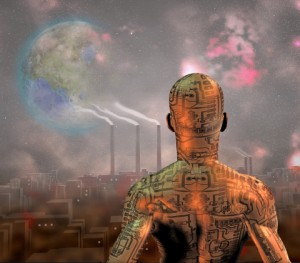 You don’t have to be a rocket scientist or a radical thinker to conclude humanity is on a path toward the kind of dystopian world imagined in the bleakest of scifi novels. We can’t keep trashing our planet without dire consequences. We can’t keep using up our non-renewable resources as if we have an infinite supply. We can’t keep acting as if it’s each man for himself (or country for itself) without the social fabric of our world completely disintegrating.
You don’t have to be a rocket scientist or a radical thinker to conclude humanity is on a path toward the kind of dystopian world imagined in the bleakest of scifi novels. We can’t keep trashing our planet without dire consequences. We can’t keep using up our non-renewable resources as if we have an infinite supply. We can’t keep acting as if it’s each man for himself (or country for itself) without the social fabric of our world completely disintegrating.
If we keep on this path, we’ll have a hard time conveying to our grandkids or great-grandkids what it was like to see a pod of whales, or monarch butterflies, or a thriving ecosystem, because it will be hard for them to even imagine such things actually existed outside of books. We’ll have difficulty describing the long period of relative comfort and peace most of humanity experienced before violent conflicts over water, arable land, and energy sources led to chaos (or World War III, or military dictatorship, or a totalitarian regime). It will be nearly impossible to explain why half the people on the planet did nothing while the other half starved or wandered the world as refugees no would take.
How do we open our eyes, ears, and minds to what’s going on – so we can do something about it – without being overwhelmed with despair? It is possible, although it’s not easy.
First, we have to allow the awful stuff to be. That is, we have to give up the relative comfort of denial. We can’t wait to face what’s going on until we have a complete solution. We have to open our eyes, ears, and minds, and – for the moment – just perceive. This may be scary. It may hurt. But it’s a necessary part of the process of becoming a full human being and doing our part to benefit the world.
Our minds want to protect us from the pain of facing suffering, whether it is our own suffering or the suffering of others for which we bear some responsibility. We keep ourselves busy, entertained, or numb. We create stories of shame or blame to give us an illusion of control over the suffering. We’ll ordinarily do anything but just “allow” it to be true (as if we can make it untrue simply by wishing it). This is why Buddhists meditate – it helps us get to know our minds, and to use our faculty of awareness without dependence on all of our reactions and commentary.
Second, we have to embrace not-knowing. We can think all kinds of things about what’s going on – who’s to blame, what should be done, how horrible the future might be – but then forget that, actually, we don’t really know what’s going to happen. We don’t know what the next moment is going to bring, let alone the next year or decade. This is not the same as saying, “We are running toward a cliff, but who knows? Maybe once we hit the edge, we’ll be able to fly!” That’s more like embracing ignorance or willful denial. Embracing not-knowing is realistic, not optimistic. The most important aspect of it is, “My thoughts are just my thoughts, not reality itself. I can’t control the world with my mind.”
Third, we have to cultivate determination to save the world. You won’t do it singlehandedly, but you don’t have to. We may not know exactly how we’re going to do it, but we know human beings are immensely resourceful when they finally get their acts together. Our determination to save the world can’t be based on how likely we believe we are to succeed. There’s no other option. And in order for me to save the world I need others, so convincing you to get on board is all part of the process. It’s not about moral superiority or inferiority, it’s about advocating for an inspiring cause: Let’s save our planet!
This is another area where meditation can help. Over time, you can develop greater facility in using your mind instead of letting it use you. You can turn it, like a horse being turned with reins, toward a healthy, fruitful path (such as loving determination) and away from a negative, dangerous path that leads to ruin (such as despair). You don’t make a choice like that based on “objective” facts. You don’t become determined to help save the world because you become convinced that the “save the world” side is winning. You just change your mind. It’s not easy, but it is that simple.
Fourth and finally, we have to help however we can and stop comparing ourselves to others. Activists aren’t just those with the time and inclination to attend protest rallies. At the same time, we don’t have to keep on with business as usual just because everyone else seems to be. If you sincerely practice the first three steps of this process, a way forward will open for you – a way for you to open your eyes but not lose heart. A way for you to help save the world.












